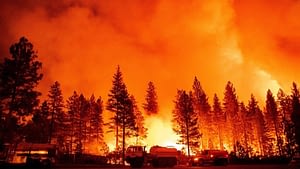
Preparing for a wildfire involves taking proactive measures to protect yourself, your property, and minimizing the risk of fire damage. Here are some steps you can take to prepare for a wildfire:
1. Stay informed: Stay updated on weather conditions and wildfire alerts in your area. Listen to local news, follow social media accounts of relevant authorities, and sign up for emergency alerts.
2. Create a defensible space: Clear vegetation and combustible materials from around your home. Maintain a distance of at least 30 feet between your house and any flammable vegetation or trees. Trim branches that hang over your roof and keep the roof and gutters clear of leaves and debris.
3. Plan an evacuation route: Identify multiple evacuation routes from your home and the surrounding area. Make sure all household members are familiar with these routes and have a designated meeting place outside the evacuation zone.
4. Prepare an emergency kit: Assemble an emergency kit with essential supplies, including water, non-perishable food, first aid items, flashlights, batteries, a battery-powered radio, extra clothing, and important documents. Keep the kit in an easily accessible location.
5. Safeguard your home: Use fire-resistant materials for the roof, siding, and windows of your house. Install spark arrestors on chimneys and stovepipe outlets, and cover attic and foundation vents with fine mesh screens to prevent ember intrusion.
6. Maintain firefighting equipment: Have fire extinguishers readily available and ensure everyone in your household knows how to use them. Keep hoses and water sources easily accessible, and consider purchasing a portable gasoline-powered water pump.
7. Prepare for power outages: Wildfires can disrupt power supply. Have a backup power source, such as a generator, and stock up on fuel. Keep your vehicles’ fuel tanks full.
8. Create a personal wildfire action plan: Develop a detailed plan for what actions you will take in the event of a wildfire. Assign responsibilities to family members, including tasks such as shutting off gas and electricity, packing emergency supplies, and evacuating pets.
9. Safeguard important documents: Keep important documents like identification papers, insurance policies, and legal documents in a fireproof and waterproof safe or store copies in a secure off-site location.
10. Stay connected and be ready to evacuate: Keep your phone charged and have spare batteries or a portable charger. Listen to emergency broadcasts and be prepared to evacuate when instructed to do so by authorities.
Remember, wildfires can be unpredictable, so it’s crucial to prioritize your safety and follow the instructions of local authorities.

